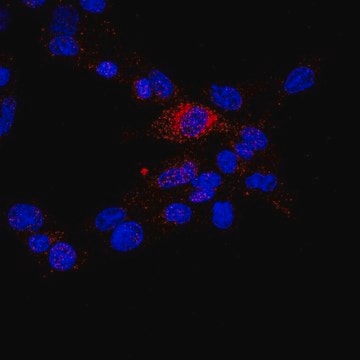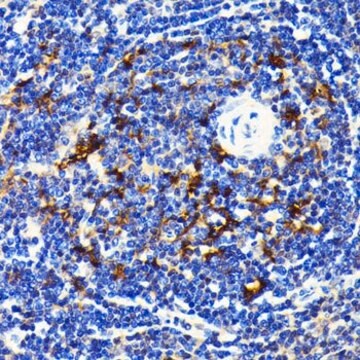MABC32
Anti-p62 (Sequestosome-1) Antibody, clone 11C9.2
clone 11C9.2, from mouse
Sinónimos:
sequestosome 1, EBI3-associated protein of 60 kDa, Paget disease of bone 3, phosphotyrosine independent ligand for the Lck SH2 domain p62, oxidative stress induced like, EBI3-associated protein p60, Phosphotyrosine-independent ligand for the Lck SH2 doma
About This Item
Productos recomendados
biological source
mouse
Quality Level
antibody form
purified antibody
antibody product type
primary antibodies
clone
11C9.2, monoclonal
species reactivity
mouse, rat, human
technique(s)
flow cytometry: suitable
immunocytochemistry: suitable
western blot: suitable
isotype
IgMκ
NCBI accession no.
UniProt accession no.
shipped in
wet ice
target post-translational modification
unmodified
Gene Information
human ... SQSTM1(8878)
General description
Immunogen
Application
Apoptosis & Cancer
Apoptosis - Additional
Flow Cytometry Analysis: 1.0 µg from a previous lot detected p62 (Sequestosome-1) in the staining of fixed and permeabilized HeLa cells.
Immunocytochemistry Analysis: A 1:500 dilution from a previous lot detected p62 (Sequestosome-1) in NIH/3T3, A431, and HeLa cells.
Quality
Western Blot Analysis: 0.001 µg/mL of this antibody detected p62 (Sequestosome-1) in 10 µg of A431 cell lysate.
Target description
The calculated molecular weight of this protein is 47 kDa and also has an isoform at 38 kDa Due to modifications, this protein may be observed up to ~60 kDa in some lysates.
Physical form
Storage and Stability
Analysis Note
A431 cell lysate
Disclaimer
¿No encuentra el producto adecuado?
Pruebe nuestro Herramienta de selección de productos.
Optional
Storage Class
12 - Non Combustible Liquids
wgk_germany
WGK 2
flash_point_f
Not applicable
flash_point_c
Not applicable
Certificados de análisis (COA)
Busque Certificados de análisis (COA) introduciendo el número de lote del producto. Los números de lote se encuentran en la etiqueta del producto después de las palabras «Lot» o «Batch»
¿Ya tiene este producto?
Encuentre la documentación para los productos que ha comprado recientemente en la Biblioteca de documentos.
Artículos
Autophagy is a regulated process involved in cell growth, development, and recycling of cytoplasmic components in cells.
Autophagy is a regulated process involved in cell growth, development, and recycling of cytoplasmic components in cells.
Autophagy is a regulated process involved in cell growth, development, and recycling of cytoplasmic components in cells.
Autophagy is a regulated process involved in cell growth, development, and recycling of cytoplasmic components in cells.
Nuestro equipo de científicos tiene experiencia en todas las áreas de investigación: Ciencias de la vida, Ciencia de los materiales, Síntesis química, Cromatografía, Analítica y muchas otras.
Póngase en contacto con el Servicio técnico








